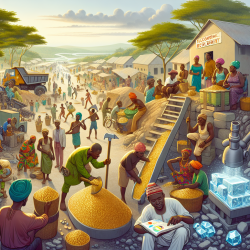The research article "Integrated Assessment of Artisanal and Small-Scale Gold Mining in Ghana — Part 3: Social Sciences and Economics" provides a comprehensive analysis of the artisanal and small-scale gold mining (ASGM) sector in Ghana. This blog post aims to distill key insights from the research to help practitioners improve their skills and encourage further exploration into this critical area.
The Economic and Social Drivers of ASGM
The study highlights that ASGM is a significant contributor to Ghana's economy, providing employment and income for many individuals who lack alternative livelihood options. The sector is driven by both microeconomic and macroeconomic factors. At the micro level, individuals are often "pushed" into ASGM due to poverty and unemployment, while at the macro level, ASGM contributes significantly to the national economy despite operating under complex challenges.
The research identifies that many involved in ASGM find themselves trapped in a cycle of low productivity and indebtedness, often referred to as a "poverty trap." This situation necessitates targeted interventions to break the cycle and promote sustainable economic growth.
Sustainable Development through Policy Intervention
The study underscores the importance of developing policies that are both realistic and sustainable. It suggests that formalizing ASGM through registration programs could help improve economic stability for miners. However, these policies must be designed with an understanding of the local context to ensure they are accepted and effective.
- Microcredit Programs: Implementing microcredit services tailored to ASGM communities can provide financial support for miners to invest in more efficient technologies.
- Training and Education: Providing education on sustainable mining practices can enhance productivity while minimizing environmental impact.
- Community Involvement: Engaging local communities in policy development ensures that interventions are culturally sensitive and more likely to succeed.
The Role of Further Research
The research calls for continued investigation into the social, economic, health, and environmental dimensions of ASGM. Practitioners are encouraged to explore these areas further to develop comprehensive strategies that address the unique challenges faced by ASGM communities.
Conclusion
The integrated assessment provides valuable insights into the complexities of ASGM in Ghana. By implementing evidence-based policies and encouraging further research, practitioners can contribute to sustainable development within this sector. Addressing the economic drivers and consequences of ASGM will not only improve livelihoods but also enhance social stability and environmental sustainability.










